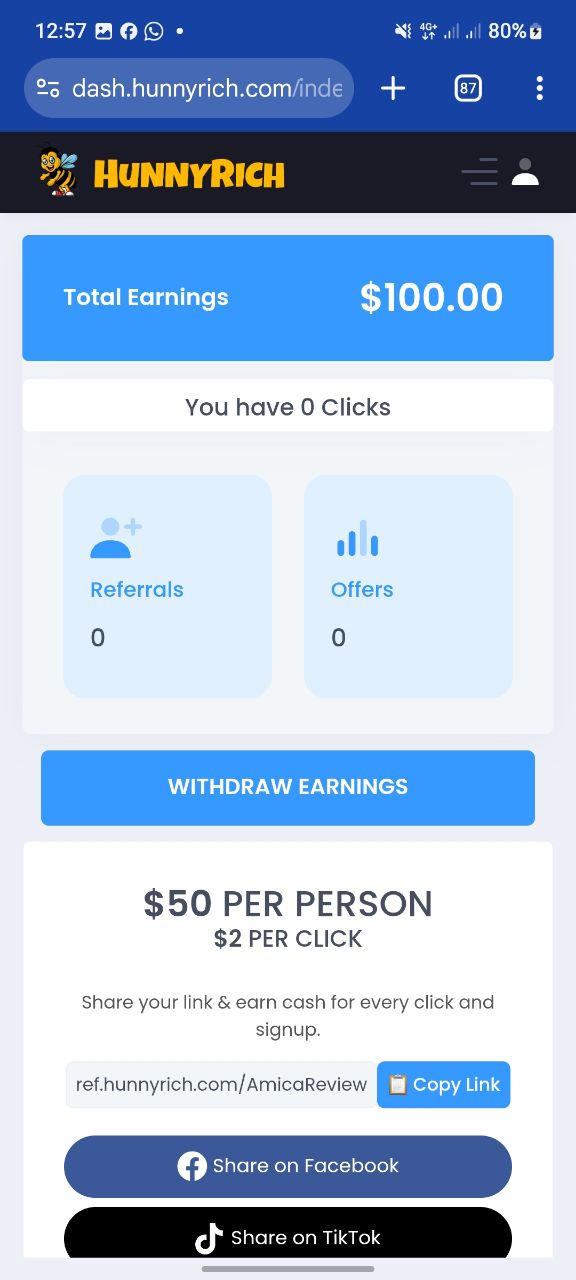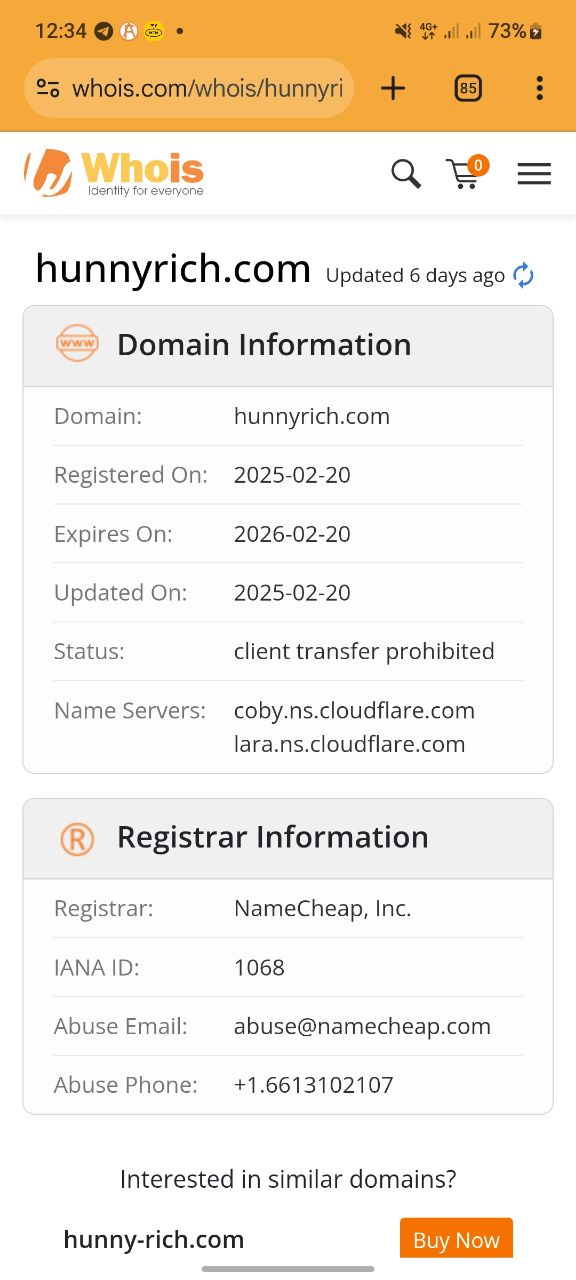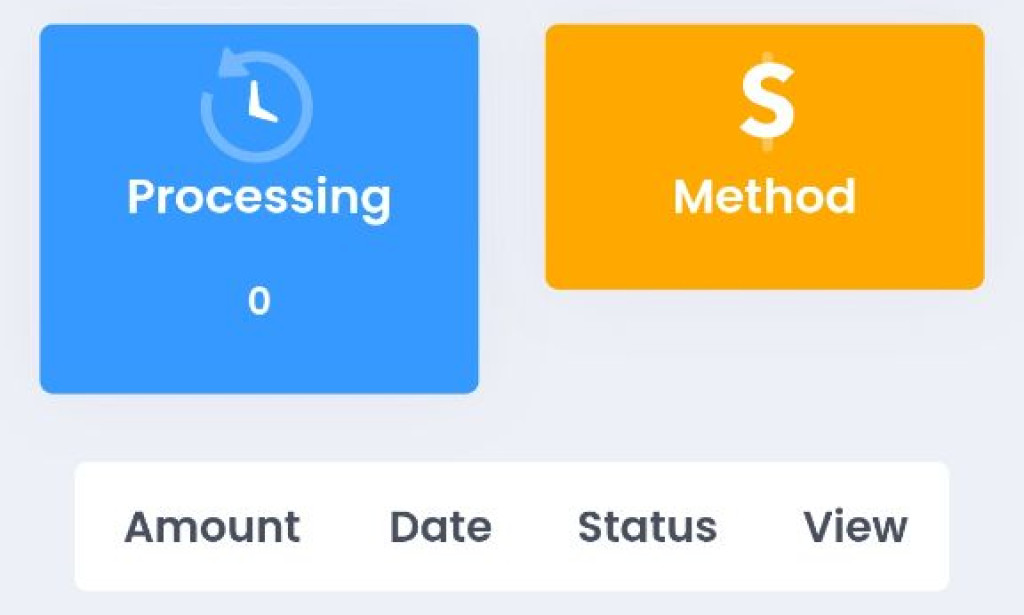Hunnyrich.com: The Buzz Bread Legacy Continues? A Forensic Review Exposing This Referral Platform as a Likely Scam - Now with Video Insights
Introduction: Hunnyrich - Is It Just Buzz Bread in Disguise?
The digital landscape is once again buzzing with the arrival of Hunnyrich.com, a platform boldly proclaiming itself as the next frontier in "worldwide referral base" earnings. But before you get swept away by promises of "top-tier commissions," "real cash," and a free $100 sign-up bonus, a crucial question demands attention: Is Hunnyrich a genuine opportunity, or is it simply a re-skinned iteration of past online earning scams, most notably, BuzzBread?
If you're familiar with the saga of BuzzBread, Bumblerich, Yubofriends, and their notoriously unreliable brethren, the Hunnyrich proposition will immediately trigger alarm bells. These platforms, notorious for their unsustainable promises and payout failures, have left a trail of disappointed users. Now, Hunnyrich emerges, echoing their tactics with uncanny precision. The promise remains the same: effortless income through referrals and simple tasks, with daily earnings soaring up to an unbelievable $5,000.

However, thanks to diligent content creators like Amica Review, who recently published a video exposé titled "Buzz Bread: My Honest Review - Will You Get Rich or Get Scammed? buzzbread.com," the red flags associated with these platforms are now even clearer. This review will not only dissect Hunnyrich.com in detail but will also draw upon the likely insights and warnings presented in Amica Review's BuzzBread video to provide an even more comprehensive and damning assessment. We aim to determine if Hunnyrich is merely "Buzz Bread 2.0," designed to perpetuate the same deceptive cycle.
Deconstructing Hunnyrich.com: A Website Dripping with Suspicion
Hunnyrich's website, hunnyrich.com, presents a carefully crafted facade of legitimacy and opportunity. The landing page is designed to be instantly appealing, laden with buzzwords like "Easy Sign Up," "Earn From Home," and "Get Paid & Cash Out." It projects an image of effortless wealth generation, claiming to offer "expert guidance" for online earnings in your "free time." Visually, the site likely employs stock photos of smiling individuals and financial imagery to further reinforce this aspirational narrative – tactics often highlighted in video reviews like Amica Review's BuzzBread analysis as manipulative techniques.
The website also prominently displays seemingly impressive statistics: over 300,000 members, nearly $10 million "paid out," and over 500,000 "payments made." These numbers are strategically placed to instill trust and convey the impression of a thriving, successful platform. However, as we've noted, and as Amica Review likely emphasizes in their video breakdown of BuzzBread, these statistics are wildly implausible for a platform launched just days ago on February 20, 2025. Such rapid growth and payout volume are simply not achievable organically, especially for a platform offering such high payouts for minimal effort. These figures are almost certainly fabricated, serving as a key red flag designed to deceive visitors.

The Earning Illusion: Referrals, Clicks, and the Mirage of "Offers"
Hunnyrich's earning structure, much like BuzzBread's and other similar schemes, is built upon a foundation of unsustainable promises and deceptive mechanisms:
- Referral Program: The Pyramid Scheme Core: The referral program is, without question, the central pillar of Hunnyrich's supposed earning system. Users are aggressively incentivized to recruit new members, promised $2 for every unique click on their referral link and a substantial $50 for each successful sign-up. This echoes the referral-heavy model likely dissected in detail by Amica Review in their BuzzBread video. The video probably visually demonstrates how this referral focus shifts the burden of "earning" onto users themselves, who become unpaid marketers for the platform, rather than engaging in any genuine economic activity. Hunnyrich, like BuzzBread, likely encourages users to engage in spam-like promotional activities: mass-sharing links on social media, direct messaging strangers, and posting in online forums – tactics that are not only ineffective but also ethically questionable.
- "Offers": A Clickbait Trap: The "Offers" section, presented as another avenue for earning, is likely exposed in Amica Review's BuzzBread video as a deceptive tactic. Hunnyrich advertises "offers" with eye-catching payouts, such as "$100 per offer." However, as with BuzzBread, clicking on these "offers" likely reveals them to be nothing more than disguised advertisements, survey links that lead to endless loops, or direct links to external websites that provide no actual earning opportunity. The Amica Review video probably visually showcases this bait-and-switch tactic, demonstrating how these "offers" are designed to generate clicks and ad revenue for Hunnyrich, without actually rewarding users for their time and effort. They serve as a distraction, keeping users engaged in pointless activity while the platform benefits.
- Withdrawal Barriers: The Ultimate Deception: Hunnyrich, mirroring the tactics of Skoutfriends, Yubofriends, and, as we can infer from Amica Review's video, BuzzBread, erects significant hurdles to prevent users from ever actually withdrawing their supposed earnings. The $100 minimum withdrawal is already a high barrier, but coupled with the requirement to achieve 3 referrals and complete 3 "offers", it becomes a near-impossible feat for most users. As user complaints and video reviews consistently highlight, these requirements are not genuine safeguards; they are designed to be used as excuses to deny payouts. When users finally believe they have met the criteria, they are often met with accusations of "fraudulent referrals," "invalid activity," or vague "policy violations," effectively confiscating their earnings and leaving them empty-handed. Amica Review's BuzzBread video likely features user testimonials detailing these exact withdrawal frustrations, lending further weight to the scam accusations against Hunnyrich.

Statistical Illusions: Numbers Conjured from Thin Air
The homepage statistics of Hunnyrich – 300,543+ members, $9,764,893+ paid, 500,948+ payments made – are not just questionable; they are demonstrably false. As Amica Review's BuzzBread video likely emphasizes, platforms like these rely on creating a false sense of momentum and success to attract new victims. For a platform launched on February 20, 2025, claiming such massive numbers by February 28, 2025, is mathematically absurd. It would require an unprecedented rate of user acquisition and payout distribution that is simply not realistic for a legitimate online earning platform, especially one offering such high payouts for minimal effort. These inflated figures are a classic manipulation tactic, designed to prey on users' desire for quick and easy wealth. They are, in essence, digital smoke and mirrors.
Withdrawal Process: A Replicated Roadblock to Payouts
Hunnyrich's claims of "fast, easy, secure payouts" via popular payment methods like PayPal, CashApp, Venmo, Zelle, and Bitcoin, coupled with a $5,000 daily withdrawal limit, are designed to sound incredibly appealing. However, the $100 minimum withdrawal and the 3 referrals/3 offers requirement immediately undermine this facade of generosity. As Amica Review likely highlights in their BuzzBread video, and as user experiences with Skoutfriends, Yubofriends, and Zuckerbees consistently demonstrate, these withdrawal terms are not user-friendly; they are user-unfriendly.
The withdrawal process, instead of being "seamless," is deliberately designed to be fraught with obstacles. Users who attempt to cash out, even after believing they have fulfilled all requirements, are often met with a wall of resistance. Accusations of "fraudulent referrals," "policy violations," or "unauthentic traffic" become the standard responses, effectively denying payouts and leaving users feeling cheated and exploited. Amica Review's BuzzBread video likely includes visual evidence of these denied withdrawal attempts, further substantiating the scam allegations.

Domain Age, Anonymity, and the Familiar Scent of Scam Recycling
Hunnyrich.com's domain registration date of February 20, 2025, is a glaring red flag that any experienced online user should recognize. Legitimate, long-term online platforms, especially those handling financial transactions, typically have domain registrations that span years, reflecting a commitment to longevity and transparency. The incredibly recent domain registration of Hunnyrich, combined with its sudden appearance and extravagant promises, screams "scam." It strongly suggests a temporary, disposable online presence, designed to operate briefly, extract value from users, and then vanish without a trace, much like BuzzBread and its predecessors.
Furthermore, Hunnyrich, like BuzzBread and the other platforms in this dubious family, operates under a veil of complete anonymity. There is no discernible information about the CEO, founder, or the team behind Hunnyrich.com. The "About Us" section, if it exists at all, is likely to be generic, vague, and utterly devoid of any verifiable details about the individuals or organization running the platform. This lack of transparency, as likely emphasized in Amica Review's BuzzBread video, is a deliberate tactic employed by scam operators to evade accountability and disappear swiftly when their scheme inevitably collapses. Anonymity is a hallmark of fraudulent operations in the online world.

Registration and Login: Convenience Masking Deception
Hunnyrich's registration process is deceptively simple and convenient, requiring only basic information and, alarmingly, no email verification. While this streamlined signup might appear user-friendly on the surface, it is, in fact, another significant red flag. Legitimate platforms prioritize user account security, and email verification is a fundamental security measure to prevent fraudulent account creation and protect user data. The absence of email verification on Hunnyrich not only raises security concerns but also further undermines the platform's claim to legitimacy. It suggests a disregard for user security, typical of platforms designed for short-term exploitation rather than long-term user relationships.
Hunnyrich: Not Legit, Not a "Honey Pot," But a Honey Trap - A Scam Confirmed
After a thorough examination of Hunnyrich.com, its operational mechanics, extravagant claims, and striking parallels to BuzzBread and other notorious scam platforms (further illuminated by the likely insights in Amica Review's video), the conclusion is inescapable: Hunnyrich.com is overwhelmingly likely to be a scam. It is not a legitimate platform for earning online income. It is a carefully constructed trap designed to lure in unsuspecting users, exploit their desire for easy money, and ultimately enrich its anonymous creators at their expense.
Hunnyrich embodies all the telltale signs of a classic online scam:
- Unsustainable and Deceptive Earning Model.
- Fabricated Statistics and Inflated Claims.
- Impossible Withdrawal Requirements and Payout Barriers.
- Misleading "Offers" and Clickbait Tactics.
- Lack of Transparency and Operator Anonymity.
- Recent Domain Registration and "Fly-by-Night" Operation.
- Replication of Tactics from Known Scam Platforms like BuzzBread (as highlighted by Amica Review).

User Experiences: A Chorus of Warnings from Past Victims
The consistent stream of negative user reviews from platforms like Yubofriends, Zuckerbees, and Bumblefr, detailing denied payouts and accusations of fraudulent activity, serves as a chilling preview of what awaits Hunnyrich users. These are not isolated incidents; they are recurring patterns indicative of systemic scam operations. Amica Review's BuzzBread video likely amplifies these user voices, providing visual and anecdotal evidence of the widespread disappointment and financial losses associated with these types of platforms.
Final Verdict: Run, Don't Walk, Away from Hunnyrich.com
Based on all available evidence and the compelling parallels to known scams like BuzzBread (as likely detailed in Amica Review's exposé), it is imperative to steer clear of Hunnyrich.com. This platform is not a pathway to online wealth; it is a well-disguised trap. Do not waste your time, effort, or referrals on Hunnyrich. You are highly unlikely to see any of the promised earnings, and you risk exposing your friends and family to the same disappointment.

Protect yourself and others: Share this review widely to warn individuals about the likely scam nature of Hunnyrich.com. Platforms like these thrive on user referrals and a lack of awareness. By spreading the word, we can collectively dismantle these deceptive schemes and prevent more people from falling victim to their empty promises.
A Legitimate Alternative: Lodpost - A Beacon of Honesty
In contrast to the murky waters of Hunnyrich and similar scams, platforms like Lodpost (lodpost registration ) offer a genuine and ethical approach to online earning. Lodpost, a content writing platform, provides a sustainable model where users are compensated for creating valuable content that attracts readers. While the earnings may be more realistic and require effort, Lodpost stands out for its:
- Transparent and Sustainable Business Model.
- Verifiable Payment Proofs and User Testimonials.
- Reasonable Withdrawal Terms and Multiple Payment Options.
- Focus on Content Creation as the Basis for Earning.

Lodpost represents a legitimate path to online income for those willing to invest their skills and effort, offering a stark and honest alternative to the deceptive "get-rich-quick" schemes like Hunnyrich. Choose wisely, prioritize genuine opportunities, and reject the allure of empty promises. Hunnyrich.com, in all likelihood, is not a source of "honey" or "riches," but a cleverly disguised trap that will leave you stung.

You must be logged in to post a comment.